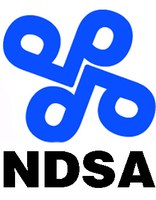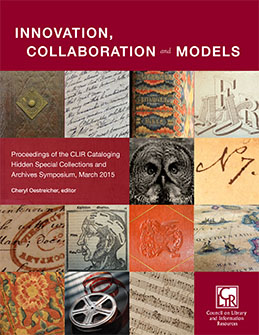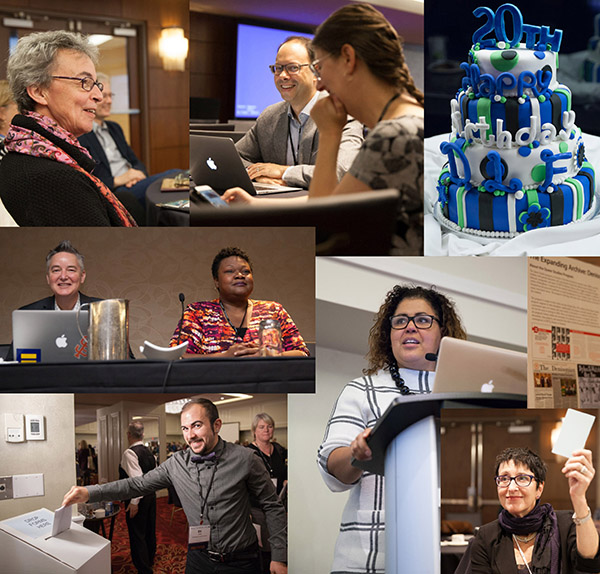
Number 108 • November/December 2015
ISSN 1944-7639 (online version)
Contents
Mellon Awards CLIR $4.34 Million for New Round of Digitization Grants
National Digital Stewardship Alliance Moves to DLF Jan. 1
Symposium Proceedings Reveal Innovative Approaches to Rare Collections
2015 DLF Forum: After 20 Years, Many Firsts
Help Plan the 2016 Liberal Arts College Preconference
Apply for Postdoctoral Fellowships by Dec. 30
Now Available: CLIR Annual Report
We invite you to view our blog series, “Re: Thinking,” which features perspectives from contributors on topics relating to the emerging digital environment, research, and higher education. In the latest blog, “The Problem is in the Room,” Adrianne Russell reflects on the recent Openlab workshop and the value of cross pollination.
CLIR Issues is produced in electronic format only. To receive the newsletter electronically, please sign up at https://www.clir.org/pubs/issues/signup.html. Content is not copyrighted and can be freely distributed.
Mellon Awards CLIR $4.34 Million for New Round of Digitization Grants
The Andrew W. Mellon Foundation has awarded CLIR $4.34 million to support a second year of the Digitizing Hidden Special Collections grant program in 2016.
Launched earlier this year, the nationally competitive program awards funds to cultural memory institutions to digitize their collections of rare and unique content. CLIR expects to announce recipients of the 2015 competition by the end of the month.
CLIR will issue a request for 2016 proposals in mid-January. The first informational webinar for prospective applicants will be held Tuesday, February 2, at 2 pm ET; webinar details will be posted in January at https://www.clir.org/hiddencollections/applicants. To stay abreast of program developments, sign up for an electronic bulletin, and follow @CLIRHC on Twitter.
“The support from the Mellon Foundation is deeply appreciated: it allows CLIR to expand the digitization of rare and special resources of greatest value to scholarship and teaching, and help inculcate best practices for making these collections accessible and reusable over time,” said CLIR President Charles Henry. “A salient result of this effort will be a genuine enhancement to the public good—making available an otherwise hidden trove of our cultural heritage.”
The Digitizing Hidden Collections program is built on the model of CLIR’s Cataloging Hidden Special Collections and Archives program, which awarded its final round of grants in 2014.
National Digital Stewardship Alliance Moves to DLF January 1
On January 1, 2016, the National Digital Stewardship Alliance (NDSA) will move to a new home at the Digital Library Federation (DLF). The selection of DLF, announced in October, followed a nationwide search and evaluation of cultural heritage, membership, and technical service organizations, in consultation with NDSA working groups, their members, and external advisors.
 Launched in 2010 by the Library of Congress as a part of the National Digital Information Infrastructure and Preservation Program with over 50 founding members, the NDSA works to establish, maintain, and advance the capacity to preserve our nation’s digital resources for the benefit of present and future generations. For an inaugural four-year term, the Library of Congress provided secretariat and membership management support to the NDSA, contributing working group leadership, expertise, and administrative support. Today, the NDSA has 165 members, including universities, government and nonprofit organizations, commercial businesses, and professional associations.
Launched in 2010 by the Library of Congress as a part of the National Digital Information Infrastructure and Preservation Program with over 50 founding members, the NDSA works to establish, maintain, and advance the capacity to preserve our nation’s digital resources for the benefit of present and future generations. For an inaugural four-year term, the Library of Congress provided secretariat and membership management support to the NDSA, contributing working group leadership, expertise, and administrative support. Today, the NDSA has 165 members, including universities, government and nonprofit organizations, commercial businesses, and professional associations.
DLF will provide leadership, logistical, and communications support for NDSA, including a new website, which will launch in January. The mission and structure of the NDSA will remain largely unchanged and it will be a distinct organization within CLIR and DLF, with all organizations benefiting from the pursuit of common goals while leveraging shared resources. Specific program alignments include the CLIR/DLF Postdoctoral Fellows in Data Curation, the DLF e-Research Network, the Digitizing Hidden Special Collections Program, and emerging projects at DLF on professional development and communities of practice.
“We are delighted at this opportunity to support the important work of the NDSA and collaborate more closely with its leadership and vibrant community,” said DLF Director Bethany Nowviskie. “DLF shares in NDSA’s core values of stewardship, collaboration, inclusiveness, and open exchange. We’re grateful for the strong foundation laid for the organization by the Library of Congress, and look forward to helping NDSA enter a new period of imagination, engagement, and growth.“
This winter and spring, NDSA plans to launch its biannual web archiving survey, and to publish results of a survey on preservation storage. NDSA’s annual meeting, Digital Preservation 2016, will be held in conjunction with the DLF Forum in November.
More information about NDSA and the transition is provided in a slide deck presented at the 2015 CNI Fall Membership Meeting, available at https://osf.io/ckjda/.
Symposium Proceedings Reveal Innovative Approaches to Rare Collections
A volume released last month, titled Innovation, Collaboration, and Models, documents the capstone event to the seven-year Cataloging Hidden Special Collections and Archives program, funded by The Andrew W. Mellon Foundation. The program was created to expose collections of high scholarly importance that were not previously discoverable online. Since the program’s inception in 2008, CLIR has awarded 129 grants totaling $27.5 million.
In the volume, edited by Cheryl Oestreicher of Boise State University, more than 20 symposium presenters examine inter-institutional collaboration, student and faculty involvement, cataloging, arrangement and description, audiovisual collections, science collections, and outreach in the volume.
 “The labor involved in cataloging hidden collections most often takes place in private corners, obscured from public view,” write CLIR staff members Amy Lucko and Christa Williford in an introduction to the volume. “Few people outside the cultural heritage professions recognize the breadth and variety of the contributions of librarians, archivists, curators, and researchers in their endeavors to understand and contextualize scholarly materials. The essays in this volume reveal innovative developments for the many kinds of intellectual labor required to make collections accessible.”
“The labor involved in cataloging hidden collections most often takes place in private corners, obscured from public view,” write CLIR staff members Amy Lucko and Christa Williford in an introduction to the volume. “Few people outside the cultural heritage professions recognize the breadth and variety of the contributions of librarians, archivists, curators, and researchers in their endeavors to understand and contextualize scholarly materials. The essays in this volume reveal innovative developments for the many kinds of intellectual labor required to make collections accessible.”
“The collections unhidden through CLIR’s cataloging initiative can—and will—transform the landscapes of research, teaching, and public engagement in humanist studies here in the U.S. and around the world,” notes Jacqueline Goldsby, professor of English and African American Studies at Yale, who gave the keynote presentation.
The two-day symposium and unconference, hosted by the University of Pennsylvania’s Kislak Center for Special Collections, Rare Books and Manuscripts, brought together more than 180 participants, including many past and current grant recipients. Kislak Center Director William Noel presented closing remarks.
The volume includes an epilogue by CLIR Distinguished Presidential Fellow Michael Peter Edson, as well as appendixes linking to unconference session notes, posters, and a report, “Learning at Work in the Archives: The Impact of Access to Primary Sources on Teaching and Learning,” by former CLIR Postdoctoral Fellows Kelly Miller and Michelle Morton.
The report is available in electronic format only. The PDF and keynote videos are available at https://www.clir.org/pubs/reports/pub169.
2015 DLF Forum: After 20 Years, Many Firsts
Even as the Digital Library Federation (DLF) celebrates its 20th birthday, the 2015 Forum was notable for several “firsts.” Held in Vancouver Oct. 26-28, the Forum was our first in Canada and the largest yet, with some 600 attendees, including those attending DLF’s affiliated events.
For the first time, a Liberal Arts College preconference was held in conjunction with the Forum. The one-day meeting was designed to foster conversation and build community among those who work with digital libraries or digital scholarship at liberal arts colleges. The preconference included concurrent sessions of presentations and panels on pedagogical, organizational, and technological approaches to digital humanities and digital scholarship, data curation, digital collections, and digital preservation. “No librarian needs to be a specifically digital librarian to understand the power that digital libraries and digital materials can bring to support the liberal arts,” wrote Megan Browndorf, history liaison for Towson University’s Cook Library, in a blog post from the Forum. “This liberal arts pre-conference very much brought that home.”
Also for the first time, the Forum included a new cohort of DLF members from the museum community, thanks to support from the Samuel H. Kress Foundation. “The opportunity to network and learn from other art museum digital specialists and compare and contrast our experience was invaluable as a new outlet for support and exploration,” writes Kristen Regina, president of the Art Libraries Society of North America and director of the Library and Archives at the Philadelphia Museum of Art, in her blog post, “Bridging the Glam Gap.”
New in 2015 was a program for establishing mentoring relationships among community members. The program is centered around face-to-face interaction at the Forum, and more than 100 participated as mentors and mentees. “DLF comes down to the people,” wrote Kevin Clair, of the University of Denver. “Some of my favorite conversations . . . were really all about how to keep [the] conversations going after the conference is over, through the fellowship and mentoring programs that DLF is starting to get going now.”
The 2015 Forum was the first under the leadership of DLF’s new director, Bethany Nowviskie, and perhaps most notably, it focused not just on the “how” of digital library technologies, but also on the “why”—the social, political, and ethical contexts of the library and information professions. The theme was powerfully conveyed by Safiya Noble, assistant professor in the Department of Information Studies at UCLA’s Graduate School of Education and Information Studies, in her keynote address.
“From the keynote at the DLF Liberal Arts College pre-conference with Chris Bourg and Cecily Walker to the #ourDLF closing event, DLF presenters and attendees were engaged in thinking about the broader context of the work that we do, framing it within cultural, social, and political contexts,” writes Jasmine Jones, of Smith College in her blog post, “Exploring the Boundaries at the DLF Forum.” “Every session, even those that were more technical, had me thinking about what it means to be an information professional that challenges the inherent structures of power and biases in the systems we develop, the vocabularies we use, etc.; what it means to be ethical and meaningful in praxis; about how to ensure inclusivity when developing services for our communities.”
Several Forum sessions were recorded and will be announced when they are available. A rich range of perspectives on the Forum are available through blog posts at https://www.diglib.org/category/forum/.
Next year’s Forum will take place Nov. 7-9 in Milwaukee, Wisconsin.

Help Plan the 2016 DLF Liberal Arts Colleges Preconference
After a wonderfully successful Liberal Arts Colleges Pre-conference (view program) in Vancouver this fall, we heard from participants that they would like to see the LAC Pre-conference happen at next year’s Forum. Would you like to help plan the day? Please tell us a little about yourself by completing this form by January 10, 2016. A small committee will be selected in mid-January to start the planning.This opportunity is open to members of the DLF and the larger LAC digital library community. Participating in the DLF-LAC Planning Committee will involve regular phone meetings, and attendance at the Pre-conference in Milwaukee, Wisconsin, on November 6, 2016 (before the Forum, which will be held November 7-9, 2016).
Feel free to contact past co-chairs Laurie Allen (lallen@haverford.edu) and Kelcy Shepherd (kshepherd@amherst.edu) with any questions.
Apply for Postdoctoral Fellowships by Dec. 30!
A dozen two-year postdoctoral fellowships—in academic libraries, in data curation for the sciences and social sciences, and in data curation for Medieval Studies—are being offered for 2016-2018. Among the fellowships: data curator at the Center for Advancement of Data and Research in Economics at the Federal Reserve Bank of Kansas City; fellow in data curation for Medieval Studies in the Preservation Research and Testing Division of the Library of Congress; Bollinger Fellow in Library Innovation at the University of Pennsylvania Libraries.
Help us spread the word about these great opportunities—application deadline is December 30!
Now Available: CLIR Annual Report 2014-2015
CLIR has just published its 2014-2015 Annual Report. Find it at https://www.clir.org/pubs/annual.

